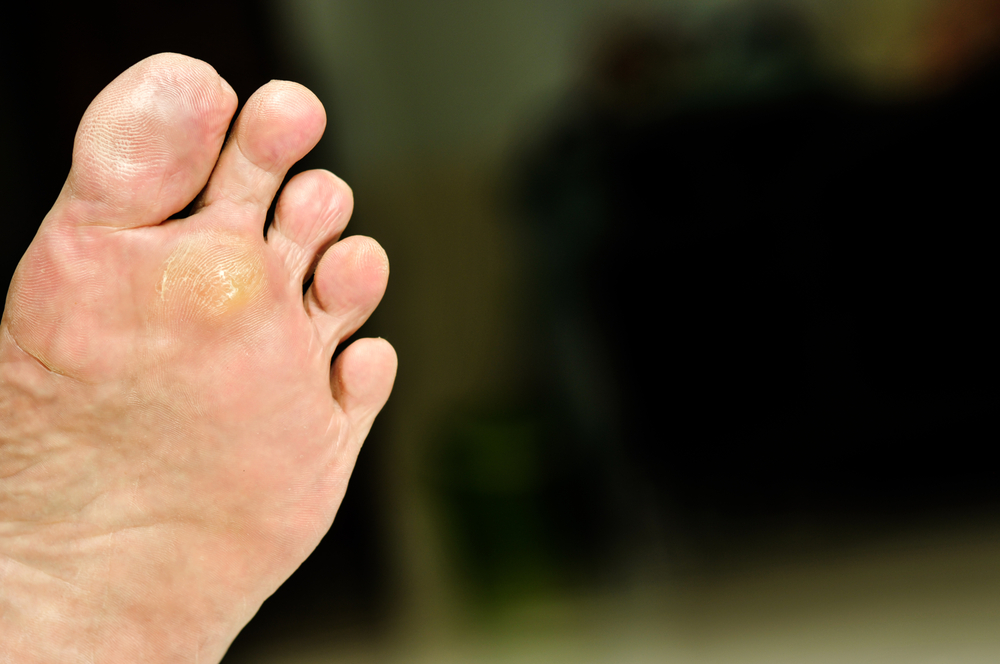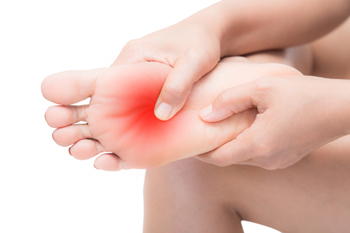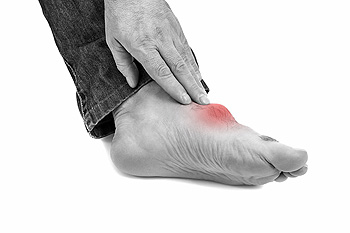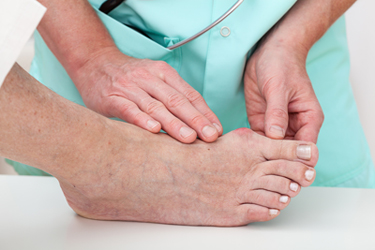March 2020
Where on the Feet Does a Plantar Wart Develop?
 A wart that develops on the sole of the foot is commonly referred to as a plantar wart. Standing and walking may cause the wart to grow inward, which can produce severe pain and discomfort. It may happen from being exposed to the type of fungus that is known as human papillomavirus, which is also known as HPV. Mild relief may be found when a protective pad is worn over the wart, as this may help to provide adequate cushioning as daily activities are completed. For stubborn plantar warts that do not heal, it is suggested that you consult with a podiatrist who can perform the necessary medical procedures, which may include the use of prescription medicines.
A wart that develops on the sole of the foot is commonly referred to as a plantar wart. Standing and walking may cause the wart to grow inward, which can produce severe pain and discomfort. It may happen from being exposed to the type of fungus that is known as human papillomavirus, which is also known as HPV. Mild relief may be found when a protective pad is worn over the wart, as this may help to provide adequate cushioning as daily activities are completed. For stubborn plantar warts that do not heal, it is suggested that you consult with a podiatrist who can perform the necessary medical procedures, which may include the use of prescription medicines.
Plantar warts can be very uncomfortable. If you need your feet checked, contact one of our podiatrists from Bazzi Podiatry. Our doctors will assist you with all of your foot and ankle needs.
About Plantar Warts
Plantar warts are the result of HPV, or human papillomavirus, getting into open wounds on the feet. They are mostly found on the heels or balls of the feet.
While plantar warts are generally harmless, those experiencing excessive pain or those suffering from diabetes or a compromised immune system require immediate medical care. Plantar warts are easily diagnosed, usually through scraping off a bit of rough skin or by getting a biopsy.
Symptoms
- Lesions on the bottom of your feet, usually rough and grainy
- Hard or thick callused spots
- Wart seeds, which are small clotted blood vessels that look like little black spots
- Pain, discomfort, or tenderness of your feet when walking or standing
Treatment
- Freezing
- Electric tool removal
- Laser Treatment
- Topical Creams (prescription only)
- Over-the-counter medications
To help prevent developing plantar warts, avoid walking barefoot over abrasive surfaces that can cause cuts or wounds for HPV to get into. Avoiding direct contact with other warts, as well as not picking or rubbing existing warts, can help prevent the further spread of plantar warts. However, if you think you have developed plantar warts, speak to your podiatrist. He or she can diagnose the warts on your feet and recommend the appropriate treatment options.
If you have any questions please feel free to contact one of our offices located in Detroit, West Detroit, Northwest Detroit, Sterling Heights, Hamtramck and Dearborn Heights, MI . We offer the newest diagnostic and treatment technologies for all your foot and ankle needs.
What Symptoms are Indicative of Morton’s Neuroma?
 One common cause of Morton’s neuroma includes wearing footwear that is too tight for your feet. This condition may occur when a nerve between the toes becomes pinched and inflamed, often causing a numbing or tingling feeling in the affected foot. Some patients have also expressed it felt as if they were walking with a pebble in their shoe, as well as a burning felt in the forefoot. Along with ill fitting footwear, certain foot deformities may also be a factor in the development of Morton’s neuroma. Some conditions that increase your risk of developing a neuroma may include hammertoes and bunions. To help alleviate some of the discomfort associated with this condition, patients have found using insoles and custom orthotics to be quite helpful. If you believe you have developed Morton’s neuroma and would like more information on how to treat this condition, it is suggested that you speak with a podiatrist.
One common cause of Morton’s neuroma includes wearing footwear that is too tight for your feet. This condition may occur when a nerve between the toes becomes pinched and inflamed, often causing a numbing or tingling feeling in the affected foot. Some patients have also expressed it felt as if they were walking with a pebble in their shoe, as well as a burning felt in the forefoot. Along with ill fitting footwear, certain foot deformities may also be a factor in the development of Morton’s neuroma. Some conditions that increase your risk of developing a neuroma may include hammertoes and bunions. To help alleviate some of the discomfort associated with this condition, patients have found using insoles and custom orthotics to be quite helpful. If you believe you have developed Morton’s neuroma and would like more information on how to treat this condition, it is suggested that you speak with a podiatrist.
Morton’s neuroma is a very uncomfortable condition to live with. If you think you have Morton’s neuroma, contact one of our podiatrists of Bazzi Podiatry. Our doctors will attend to all of your foot care needs and answer any of your related questions.
Morton’s Neuroma
Morton's neuroma is a painful foot condition that commonly affects the areas between the second and third or third and fourth toe, although other areas of the foot are also susceptible. Morton’s neuroma is caused by an inflamed nerve in the foot that is being squeezed and aggravated by surrounding bones.
What Increases the Chances of Having Morton’s Neuroma?
- Ill-fitting high heels or shoes that add pressure to the toe or foot
- Jogging, running or any sport that involves constant impact to the foot
- Flat feet, bunions, and any other foot deformities
Morton’s neuroma is a very treatable condition. Orthotics and shoe inserts can often be used to alleviate the pain on the forefront of the feet. In more severe cases, corticosteroids can also be prescribed. In order to figure out the best treatment for your neuroma, it’s recommended to seek the care of a podiatrist who can diagnose your condition and provide different treatment options.
If you have any questions, please feel free to contact one of our offices located in Detroit, West Detroit, Northwest Detroit, Sterling Heights, Hamtramck and Dearborn Heights, MI . We offer the newest diagnostic and treatment technologies for all your foot care needs.
Heel Pain Can Be Treated!
Can Certain Foods Cause Gout?
 A type of inflammatory arthritis is referred to as gout. This can be a painful and debilitating foot condition that commonly affects the big toe. It may occur as a result of elevated uric acid levels in the blood, and can develop due to genetic factors, or from certain foods that are eaten. These types of foods often include red meat, shellfish, and drinks that have a high sugar content. Some of the symptoms that are associated with gout can include severe pain and discomfort, swelling, and it is often difficult to walk. If you have frequent gout attacks, it may be beneficial to consider eating healthier foods, and drinking plenty of water. For patients who are experiencing symptoms of this condition, it is strongly suggested that you seek a consultation with a podiatrist for professional care.
A type of inflammatory arthritis is referred to as gout. This can be a painful and debilitating foot condition that commonly affects the big toe. It may occur as a result of elevated uric acid levels in the blood, and can develop due to genetic factors, or from certain foods that are eaten. These types of foods often include red meat, shellfish, and drinks that have a high sugar content. Some of the symptoms that are associated with gout can include severe pain and discomfort, swelling, and it is often difficult to walk. If you have frequent gout attacks, it may be beneficial to consider eating healthier foods, and drinking plenty of water. For patients who are experiencing symptoms of this condition, it is strongly suggested that you seek a consultation with a podiatrist for professional care.
Gout is a painful condition that can be treated. If you are seeking treatment, contact one of our podiatrists from Bazzi Podiatry. Our doctors will treat your foot and ankle needs.
What Is Gout?
Gout is a form of arthritis that is characterized by sudden, severe attacks of pain, redness, and tenderness in the joints. The condition usually affects the joint at the base of the big toe. A gout attack can occur at any random time, such as the middle of the night while you are asleep.
Symptoms
- Intense Joint Pain - Usually around the large joint of your big toe, and it most severe within the first four to twelve hours
- Lingering Discomfort - Joint discomfort may last from a few days to a few weeks
- Inflammation and Redness -Affected joints may become swollen, tender, warm and red
- Limited Range of Motion - May experience a decrease in joint mobility
Risk Factors
- Genetics - If family members have gout, you’re more likely to have it
- Medications - Diuretic medications can raise uric acid levels
- Gender/Age - Gout is more common in men until the age of 60. It is believed that estrogen protects women until that point
- Diet - Eating red meat and shellfish increases your risk
- Alcohol - Having more than two alcoholic drinks per day increases your risk
- Obesity - Obese people are at a higher risk for gout
Prior to visiting your podiatrist to receive treatment for gout, there are a few things you should do beforehand. If you have gout you should write down your symptoms--including when they started and how often you experience them, important medical information you may have, and any questions you may have. Writing down these three things will help your podiatrist in assessing your specific situation so that he or she may provide the best route of treatment for you.
If you have any questions, please feel free to contact one of our offices located in Detroit, West Detroit, Northwest Detroit, Sterling Heights, Hamtramck and Dearborn Heights, MI . We offer the newest diagnostic and treatment technologies for all your foot care needs.
The Definition of a Bunion
 The medical term for a condition that is referred to as a bunion, is known as a hallux valgus deformity. It is defined as a bony protrusion that forms on the side of the big toe, and may affect the positioning toes next to it. It may occur from genetic factors, or from wearing shoes that do not have adequate room for the toes to move freely in. This condition is also considered to be a form of arthritis. It may lead to bursitis, which is an inflammation that develops over the affected joint. If you are in the beginning stages of developing a bunion, it is advised that you are under the care of a podiatrist who can offer a correct diagnosis and begin the proper treatment.
The medical term for a condition that is referred to as a bunion, is known as a hallux valgus deformity. It is defined as a bony protrusion that forms on the side of the big toe, and may affect the positioning toes next to it. It may occur from genetic factors, or from wearing shoes that do not have adequate room for the toes to move freely in. This condition is also considered to be a form of arthritis. It may lead to bursitis, which is an inflammation that develops over the affected joint. If you are in the beginning stages of developing a bunion, it is advised that you are under the care of a podiatrist who can offer a correct diagnosis and begin the proper treatment.
If you are suffering from bunion pain, contact one of our podiatrists of Bazzi Podiatry. Our doctors can provide the care you need to keep you pain-free and on your feet.
What Is a Bunion?
Bunions are painful bony bumps that usually develop on the inside of the foot at the joint of the big toe. As the deformity increases over time, it may become painful to walk and wear shoes. Women are more likely to exacerbate existing bunions since they often wear tight, narrow shoes that shift their toes together. Bunion pain can be relieved by wearing wider shoes with enough room for the toes.
Causes
- Genetics – some people inherit feet that are more prone to bunion development
- Inflammatory Conditions - rheumatoid arthritis and polio may cause bunion development
Symptoms
- Redness and inflammation
- Pain and tenderness
- Callus or corns on the bump
- Restricted motion in the big toe
In order to diagnose your bunion, your podiatrist may ask about your medical history, symptoms, and general health. Your doctor might also order an x-ray to take a closer look at your feet. Nonsurgical treatment options include orthotics, padding, icing, changes in footwear, and medication. If nonsurgical treatments don’t alleviate your bunion pain, surgery may be necessary.
If you have any questions, please feel free to contact one of our offices located in Detroit, West Detroit, Northwest Detroit, Sterling Heights, Hamtramck and Dearborn Heights, MI . We offer the newest diagnostic and treatment technologies for all your foot care needs.





